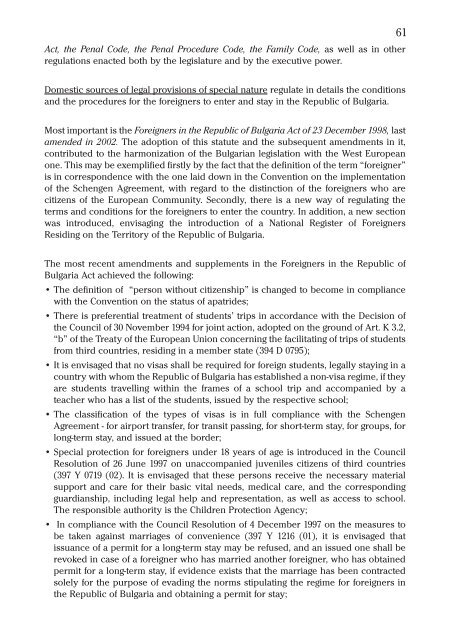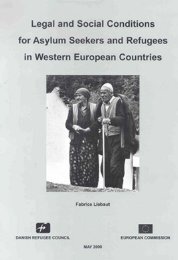Bulgaria - The social impact of seasonal migration
Bulgaria - The social impact of seasonal migration
Bulgaria - The social impact of seasonal migration
Create successful ePaper yourself
Turn your PDF publications into a flip-book with our unique Google optimized e-Paper software.
Act, the Penal Code, the Penal Procedure Code, the Family Code, as well as in other<br />
regulations enacted both by the legislature and by the executive power.<br />
Domestic sources <strong>of</strong> legal provisions <strong>of</strong> special nature regulate in details the conditions<br />
and the procedures for the foreigners to enter and stay in the Republic <strong>of</strong> <strong>Bulgaria</strong>.<br />
Most important is the Foreigners in the Republic <strong>of</strong> <strong>Bulgaria</strong> Act <strong>of</strong> 23 December 1998, last<br />
amended in 2002. <strong>The</strong> adoption <strong>of</strong> this statute and the subsequent amendments in it,<br />
contributed to the harmonization <strong>of</strong> the <strong>Bulgaria</strong>n legislation with the West European<br />
one. This may be exemplified firstly by the fact that the definition <strong>of</strong> the term “foreigner”<br />
is in correspondence with the one laid down in the Convention on the implementation<br />
<strong>of</strong> the Schengen Agreement, with regard to the distinction <strong>of</strong> the foreigners who are<br />
citizens <strong>of</strong> the European Community. Secondly, there is a new way <strong>of</strong> regulating the<br />
terms and conditions for the foreigners to enter the country. In addition, a new section<br />
was introduced, envisaging the introduction <strong>of</strong> a National Register <strong>of</strong> Foreigners<br />
Residing on the Territory <strong>of</strong> the Republic <strong>of</strong> <strong>Bulgaria</strong>.<br />
<strong>The</strong> most recent amendments and supplements in the Foreigners in the Republic <strong>of</strong><br />
<strong>Bulgaria</strong> Act achieved the following:<br />
• <strong>The</strong> definition <strong>of</strong> “person without citizenship” is changed to become in compliance<br />
with the Convention on the status <strong>of</strong> apatrides;<br />
• <strong>The</strong>re is preferential treatment <strong>of</strong> students’ trips in accordance with the Decision <strong>of</strong><br />
the Council <strong>of</strong> 30 November 1994 for joint action, adopted on the ground <strong>of</strong> Art. K 3.2,<br />
“b” <strong>of</strong> the Treaty <strong>of</strong> the European Union concerning the facilitating <strong>of</strong> trips <strong>of</strong> students<br />
from third countries, residing in a member state (394 D 0795);<br />
• It is envisaged that no visas shall be required for foreign students, legally staying in a<br />
country with whom the Republic <strong>of</strong> <strong>Bulgaria</strong> has established a non-visa regime, if they<br />
are students travelling within the frames <strong>of</strong> a school trip and accompanied by a<br />
teacher who has a list <strong>of</strong> the students, issued by the respective school;<br />
• <strong>The</strong> classification <strong>of</strong> the types <strong>of</strong> visas is in full compliance with the Schengen<br />
Agreement - for airport transfer, for transit passing, for short-term stay, for groups, for<br />
long-term stay, and issued at the border;<br />
• Special protection for foreigners under 18 years <strong>of</strong> age is introduced in the Council<br />
Resolution <strong>of</strong> 26 June 1997 on unaccompanied juveniles citizens <strong>of</strong> third countries<br />
(397 Y 0719 (02). It is envisaged that these persons receive the necessary material<br />
support and care for their basic vital needs, medical care, and the corresponding<br />
guardianship, including legal help and representation, as well as access to school.<br />
<strong>The</strong> responsible authority is the Children Protection Agency;<br />
• In compliance with the Council Resolution <strong>of</strong> 4 December 1997 on the measures to<br />
be taken against marriages <strong>of</strong> convenience (397 Y 1216 (01), it is envisaged that<br />
issuance <strong>of</strong> a permit for a long-term stay may be refused, and an issued one shall be<br />
revoked in case <strong>of</strong> a foreigner who has married another foreigner, who has obtained<br />
permit for a long-term stay, if evidence exists that the marriage has been contracted<br />
solely for the purpose <strong>of</strong> evading the norms stipulating the regime for foreigners in<br />
the Republic <strong>of</strong> <strong>Bulgaria</strong> and obtaining a permit for stay;<br />
61

















